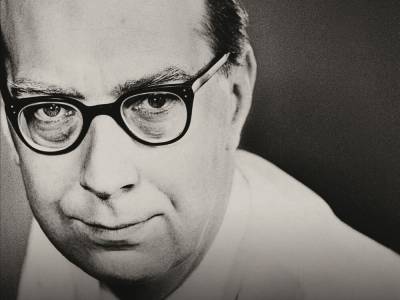Whenever I think of Philip Larkin, I’m reminded of Alan Bennett’s affectionate evisceration of him a few years ago in the London Review Of Books. Bennett, polite and pointed to a fault, portrays Larkin as a serial philanderer with a lyrical eye rather than the lonely misanthrope of popular imagination. Bennett seizes on a photo of Larkin that appeared in Select Letters. “Surrounded by his beaming middle-aged assistants – with two at least he was having or would have an affair – he looks like a walrus with his herd of contented cows,” writes Bennett.
Larkin was an individual with a depressive’s eye for the melancholy, who was keen to present himself in a way as so cut off and distant: the horny, petty hermit of Hull, a childhood of boredom and monotony, beset by baldness in his twenties and a lifelong stutter. As Kingsley Amis said at Larkin's funeral, the poet's demeanour was characterised by "impeccable attentive courtesy: grave, but at the same time sunlit”.
Bennett, for his part, was unconvinced - he even took the time to point out that Ted Hughes lived further away from London than Larkin. What's clear, however, is Larkin's career has never really recovered from Selected Letters. It revealed to the public his thinking and the public did not like the result. The admired post war poet who was buried in Westminster Abbey in 1985 turned out to be a misogynistic, bitter, resentful racist with a fondness for pornography. Sure he had a few funny lines (“I am having an ineffectual economy drive. It consists of not buying other people drinks”) and the work still stands up (if you spend your evenings bitterly watching TikTok, try reading "High Windows" instead) but only if you can cope with the stench of his personal views.
The recent book by John Sutherland about Monica Jones did much to stop her own characterisation of Lucky Jim (and perhaps her reasons for destroying Larkin’s diaries). It also helped us feel sorry for a woman who was once told by Larkin that she shouldn’t ever utter more than two sentences without interruption. (Reading Martin Amis the modern reader might justifiably feel uncomfortable about lines like “Monica was a robust and comparatively worldly blonde, with well-shaped bones (but ogreish teeth).”)
Larkin was a complicated man, in multiple difficult relationships, with women who were equally troubled. He was an extraordinary poet but a deeply troubled and resentful soul, constantly lusting after what he couldn't have. Rereading The Whitsun Weddings today, I still appreciate his craft - albeit with every reservation about the man himself and the life he chose to lead. "Without ever having known Larkin I feel, as I think many readers will, that I have lost a friend" said Bennett, although one suspects, being a friend to the man himself would have been nigh on impossible.






